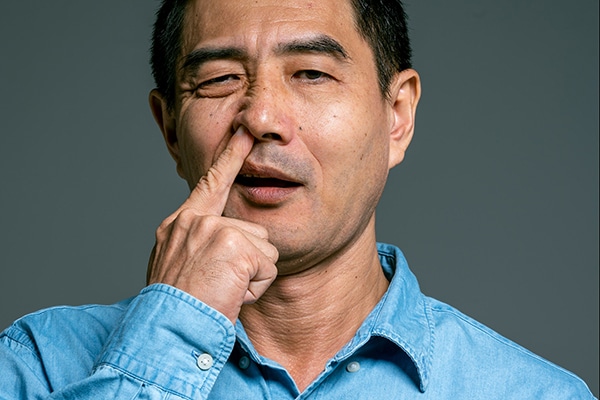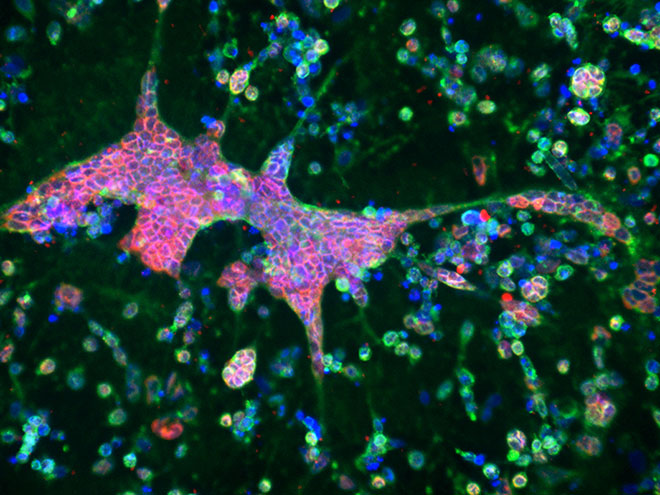Does picking your nose really increase your risk of dementia? A 2023 study points to this bad habit as a possible opportunity for pathogens to get from the outside world into the brain.
What causes Alzheimer’s disease and related forms of progressive dementia? Scientists still don’t know. One leading theory points to beta-amyloid protein — a biomarker for Alzheimer’s that builds up in the brain and causes damage to neurons — holds the key. Of course, the next question is: What causes that build-up? A 2023 study is making headlines for suggesting that pathogens could enter the brain through the nose and lead to neuroinflammation which in turn leads to neurodegenerative disease… and that sticking your finger up your nose helps these viruses and other germs along their way.
“The olfactory system represents a plausible route for pathogen entry, given its direct anatomical connection to the brain and its involvement in the early stages of [Alzheimer’s disease], the authors of the 2023 study write.
Indeed, the role of infections — even as common as the flu — in Alzheimer’s disease has been much discussed in recent years. Viruses from mono, to COVID, to herpes, to gingivitis, to Lyme disease have been anecdotally linked to dementia cases, and research to better establish — and understand — this relationship is ongoing. Antiviral medications are even being tested as a treatment for Alzheimer’s.
For now, experts say, put your mind at ease. While picking one’s nose an unbecoming habit, research that shows how pathogens could move through nasal passages to the brain to cause long-term damage has so far been done in mice. Two years ago, one such study got a lot of media traction: A 2022 study about a bacteria called C. pneumoniae, which is found in the nasal cavity and is association with deposits of Alzheimer’s biomarker beta-amyloid proteins in the brain, sounded alarms about the risks of the surprising — and surprisingly common — risk factor of nose-picking.
As one researcher pointed out in a blind peer review of the below write-up by dementia researcher Joyce Siette, nose picking is a common practice for humans of all ages. In fact, nine in 10 people admit doing it. At the same time, by the age of 20, research shows that about 50 percent of people have traces of C. pneumoniae in their blood — and that percentage rises with age.
Media spin around the C. pneumoniae study linked the two: nose-picking, and this scary bacteria. But the study was done in mice — not in humans. And as researchers know all too well when it comes to dementia and Alzheimer’s research, animal studies — especially mouse studies — rarely translate to humans.
Does picking your nose really lead to dementia? A psychologist and dementia expert digs for the truth.
Dementia researcher Joyce Siette at Australia’s Western Sydney University takes a closer look at a buzzy 2022 animal study on dementia and explains the risk.
No matter your age, we all pick our nose. However, if gripping headlines around the world are a sign, this habit could increase your risk of Alzheimer’s disease, the most common form of dementia.
One international news report said: ‘SCARY EVIDENCE’ How a common habit could increase your risk of Alzheimer’s and dementia. Another ran with: Alzheimer’s disease risk increased by picking your nose and plucking hair, warns study. An Australian news article couldn’t resist a pun: Could picking your nose lead to dementia? Australian researchers are digging into it.
Yet if we look at the research study behind these news reports, we may not need to be so concerned. The evidence connecting nose picking with the risk of dementia is still rather inconclusive.
What prompted these nose-picking headlines?
Queensland researchers published their study back in February 2022 in the journal Scientific Reports.
However, the results were not widely reported in the media until about eight months later, following a media release from Griffith University in late October. The media release had a similar headline to the multiple news articles that followed: New research suggests nose picking could increase risk for Alzheimer’s and dementia.
The media release clearly stated the research was conducted in mice, not humans. But it did quote a researcher who described the evidence as “potentially scary” for humans too.
Animal studies rarely translate to humans
The researchers wanted to learn more about the role of Chlamydia pneumoniae bacteria and Alzheimer’s disease. These bacteria have been found in brains of people with Alzheimer’s, although the studies were completed more than 15 years ago.
This bacteria species can cause respiratory infections such as pneumonia. It’s not to be confused with the chlamydia species that causes sexually transmitted infections (that’s C. trachomatis).
The researchers were interested in where C. pneumoniae went, how quickly it travelled from the nose to the brain, and whether the bacteria would create a hallmark of Alzheimer’s disease found in brain tissue, the amyloid β protein.
So they conducted a small study in mice.
The researchers injected C. pneumoniae into the noses of some mice and compared their results to other mice that received a dose of salty water instead.
They then waited one, three, seven or 28 days before euthanising the animals and examined what was going on in their brains.
What the 2022 study found
Not surprisingly, the researchers detected more bacteria in the part of the brain closest to the nose in mice that received the infectious dose. This was the olfactory brain region (involved in the sense of smell).
Mice that had the bacteria injected into their noses also had clusters of the amyloid β protein around the bacteria.
Mice that didn’t receive the dose also had the protein present in their brains, but it was more spread out. The researchers didn’t compare which mice had more or less of the protein.
Finally, the researchers found that gene profiles related to Alzheimer’s disease were more abundant in mice 28 days after infection compared with seven days after infection.
How should we interpret the results?
The study doesn’t actually mention nose-picking or plucking nose hairs. But the media release quoted one of the researchers saying this was not a good idea as this could damage the nose: “If you damage the lining of the nose, you can increase how many bacteria can go up into your brain.”
The media release suggested you could protect your nose (by not picking) and so lower your risk of Alzheimer’s disease. Again, this was not mentioned in the study itself.
At best the study results suggest infection with C. pneuomoniae can spread rapidly to the brain – in mice.
Until we have more definitive, robust studies in humans, I’d say the link between nose picking and dementia risk remains low.
This article by Joyce Siette, a research fellow at Western Syndey University, was republished from The Conversation under a Creative Commons license.
Nose pickers, take heed
In the 2023 study, the authors did offer a word of warning, regardless of what’s been proven about picking your nose and brain health so far: “One of the lessons learned from COVID-19 is the value of hand hygiene through frequent hand washing and the use of hand sanitizers, and we suggest these routine hygienic procedures be mandatory routine procedures for the incurable nose-picker.”



